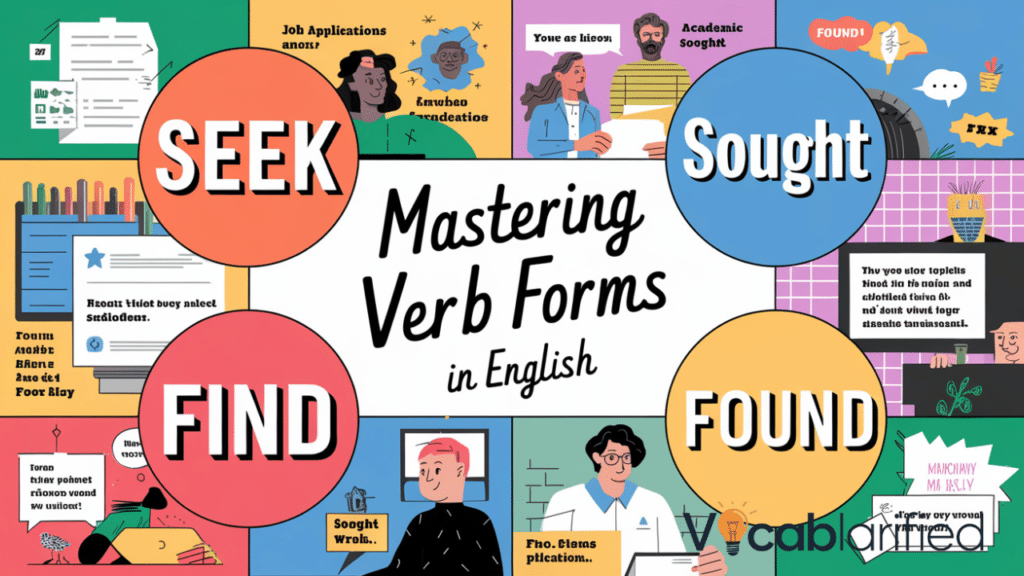English grammar can be a complex landscape of language rules that challenge even native speakers. Among the many intricacies of our language, the verb ‘seek’ presents an interesting case study in verb forms and irregular verbs.
Understanding how this word transforms in different tenses is crucial for writing clarity and effective communication.
The word ‘seek’ is not a straightforward verb that follows standard conjugation patterns. It belongs to a special category of irregular verbs that change their form in ways that might seem counterintuitive to language learners. The past tense of ‘seek’ is ‘sought’, a transformation that doesn’t follow the typical ‘-ed’ ending most regular verbs adopt.
Diving into the Origins
The verb ‘seek’ has deep roots in the English language, with its past tense form ‘sought’ emerging from historical linguistic developments. Language evolution has played a significant role in shaping how we use this verb today. Understanding its background helps us appreciate the nuanced language exceptions that make English both challenging and fascinating.
You Might Like: What’s the Plural of Foreman? Is it Foremen or Foremans?
Proper Usage in Different Contexts
Professional Communication Scenarios
When it comes to professional communication, using the correct verb form becomes paramount. In job applications, emails, and formal documents, proper tense usage can make a significant difference in how your message is perceived.
| Scenario | Incorrect Usage | Correct Usage | Impact |
|---|---|---|---|
| Job Application | I seek for a position last year | I sought a position last year | Professional Tone |
| Business Email | I seek to confirm our meeting | I sought to confirm our meeting | Clarity |
| Academic Correspondence | I seek the information yesterday | I sought the information yesterday | Credibility |
| Professional Report | I seek to resolve the issue | I sought to resolve the issue | Precision |
| Client Communication | I seek your approval | I sought your approval | Formality |
| Research Proposal | I seek funding | I sought funding | Accuracy |
| Conference Invitation | I seek to present | I sought to present | Professionalism |
| Grant Application | I seek support | I sought support | Completeness |
| Recommendation Letter | I seek opportunities | I sought opportunities | Depth |
| Performance Review | I seek improvement | I sought improvement | Reflection |
Conversational Context and Informal Language
Conversational context allows for more flexibility, but understanding the correct use of ‘sought’ remains important. In informal language, people might sometimes use ‘seek’ incorrectly, but being aware of the proper grammatical guidelines can elevate your communication skills.
You Might Like: Apostrophe After S | Easy Rules and Examples
The Complexity of Verb Transformations
Memorization Techniques for Language Learners
Learning irregular verbs like ‘seek’ requires dedicated practice. Memorization techniques can help language learners internalize these unique transformations. Creating mental associations, using mnemonic devices, and practicing in various contexts can make mastering these verb forms easier.
Common Mistakes to Avoid
Common mistakes in using ‘seek’ and ‘sought’ often stem from confusion about when to use each form. Some speakers might inadvertently mix up the present and past tenses, leading to communication errors that can impact understanding.
| Mistake | Explanation | Correct Usage | Learning Tip |
|---|---|---|---|
| Using ‘seek’ in past context | Applying present tense incorrectly | Used ‘sought’ for past events | Practice time-specific contexts |
| Overgeneralizing verb rules | Assuming all verbs follow ‘-ed’ pattern | Recognize ‘sought’ as unique form | Study irregular verb lists |
| Mixing verb tenses | Inconsistent verb usage | Maintain consistent tense | Read extensively |
| Misunderstanding verb forms | Confusion about verb transformations | Learn specific irregular verb changes | Use language learning resources |
| Pronunciation challenges | Difficulty with verb pronunciation | Practice verbal and written forms | Listen to native speakers |
| Writing errors | Spelling mistakes | Verify correct spelling | Use spell-check tools |
| Contextual misuse | Inappropriate verb choice | Match verb to specific context | Understand nuanced meanings |
| Translation errors | Direct translation issues | Use language-specific rules | Avoid literal translations |
| Academic writing mistakes | Formal language requirements | Follow academic writing guidelines | Consult style guides |
| Professional communication errors | Imprecise language use | Maintain professional tone | Proofread carefully |
You Might Like: Family’s or Families’ or Families? A Simple Guide
Practical Applications of ‘Sought’
Email Scenarios and Professional Writing
In professional communication, mastering the use of ‘sought’ becomes crucial. Consider an email scenario where precision matters. Sarah Thompson, a marketing manager, might draft an email to her team:
Subject: Project Research Outcomes
Dear Team,
I sought comprehensive market research for our upcoming product launch. The insights we sought will be instrumental in developing our strategic approach. Throughout last quarter, I sought input from multiple stakeholders to ensure a holistic understanding of our market positioning.
Best regards,
Sarah Thompson

Academic and Research Contexts
Academic writing demands extreme precision in language rules. Researchers must carefully navigate verb forms to maintain writing clarity. A research proposal might read:
“The study sought to investigate the correlation between environmental factors and urban development. Previous researchers sought similar insights, but our approach sought to differentiate itself through comprehensive methodological analysis.”
| Research Context | Verb Usage | Contextual Example | Significance |
|---|---|---|---|
| Scientific Paper | Sought | Researchers sought to validate the hypothesis | Precision |
| Dissertation | Sought | The study sought to explore uncharted territories | Academic Rigor |
| Grant Proposal | Sought | We sought funding for innovative research | Credibility |
| Conference Presentation | Sought | The research sought to challenge existing paradigms | Intellectual Depth |
| Peer-Reviewed Article | Sought | The investigation sought to bridge theoretical gaps | Scientific Methodology |
| Comparative Study | Sought | Researchers sought comparative evidence | Comprehensive Analysis |
| Exploratory Research | Sought | The team sought to understand complex interactions | Investigative Approach |
| Interdisciplinary Project | Sought | The project sought insights from multiple disciplines | Holistic Understanding |
| Longitudinal Study | Sought | Researchers sought patterns over extended periods | Temporal Perspective |
| Innovative Research | Sought | The study sought to redefine existing frameworks | Intellectual Innovation |
Navigating Language Exceptions
Understanding Linguistic Nuances
Language evolution presents fascinating challenges in English grammar. The verb ‘seek’ exemplifies how languages develop complex verb forms that defy simple conjugation rules. Native speakers often intuitively understand these language exceptions, while language learners must dedicate significant effort to mastering them.
Contextual Usage Explained
Contextual usage plays a critical role in determining the appropriate form of ‘seek’. In professional communication, precision becomes paramount. A job application email illustrates this point:
Subject: Marketing Specialist Position
Dear Mr. Robert Henderson,
I sought to apply for the Marketing Specialist position at Innovative Solutions Inc. Throughout my career, I have sought opportunities that challenge my professional capabilities and align with my strategic vision.
Sincerely,
Michael Rodriguez
Memorization and Learning Strategies
Techniques for Mastering Irregular Verbs
Memorization techniques can help learners navigate the complexities of irregular verbs. Creating mental associations and practicing in various contexts can significantly improve language proficiency.
| Learning Strategy | Description | Effectiveness | Application |
|---|---|---|---|
| Contextual Learning | Learning verb in multiple scenarios | High | Real-world usage |
| Mnemonic Devices | Creating memorable associations | Moderate | Mental triggers |
| Repetitive Practice | Consistent verb form repetition | High | Muscle memory |
| Visual Mapping | Creating visual verb transformation charts | Moderate | Visual learners |
| Storytelling | Creating narratives using verb forms | High | Contextual understanding |
| Audio Repetition | Listening and repeating verb forms | Moderate | Pronunciation |
| Comparative Analysis | Comparing similar irregular verbs | High | Pattern recognition |
| Interactive Exercises | Digital and physical verb form games | Moderate | Engagement |
| Peer Learning | Practicing with language exchange partners | High | Social learning |
| Professional Coaching | Guided language instruction | High | Structured learning |
Key Takeaways in Verb Usage
Communication Refined
Writing clarity ultimately depends on understanding subtle language rules. The verb ‘seek’ demonstrates how proper tense usage can elevate communication from good to exceptional. Whether in formal communication or conversational context, mastering verb forms reflects linguistic sophistication.
Final Thoughts on ‘Seek’ and ‘Sought’
Professional communicators, academics, and language enthusiasts must recognize that language exceptions like ‘seek’ and ‘sought’ are not obstacles but opportunities for refined expression. Each unique verb form tells a story of linguistic complexity and cultural evolution.
Practical Recommendations
Enhancing Language Proficiency
- Practice consistently across different communication contexts
- Read extensively to internalize natural verb usage
- Seek feedback from language professionals
- Embrace the complexity of linguistic nuances
In conclusion, the journey of understanding ‘seek’ and ‘sought’ is more than a grammatical exercise—it’s a celebration of language evolution and communication precision.

Emma Carter is an experienced blogger at Vocablarified. She enjoys helping people expand their vocabulary and improve their language skills. With a warm and approachable writing style, Emma makes learning new words fun and accessible. When she’s not writing, she loves reading books and discovering new phrases to share with her readers. Emma is passionate about making language learning an enjoyable journey for everyone.







